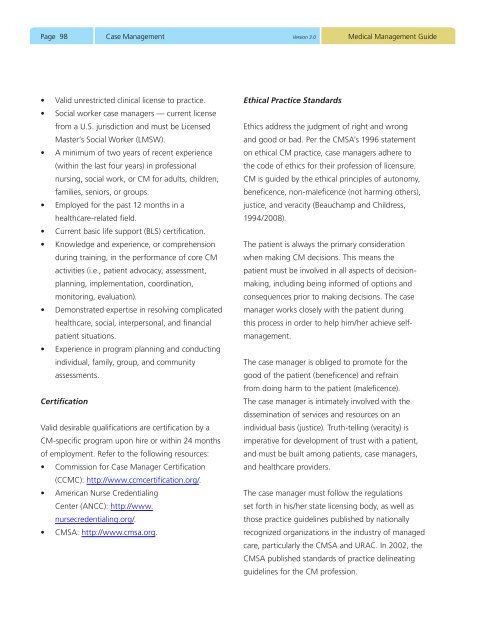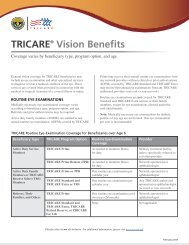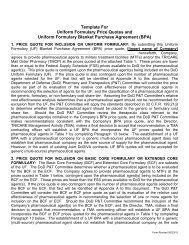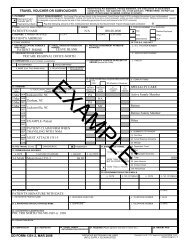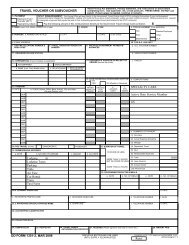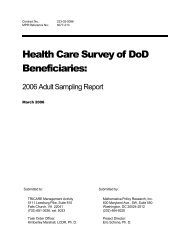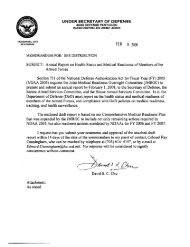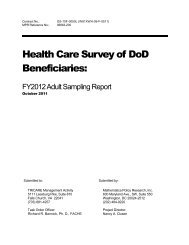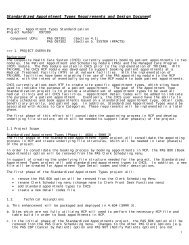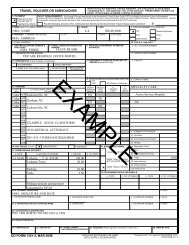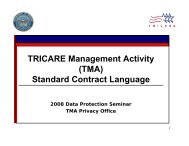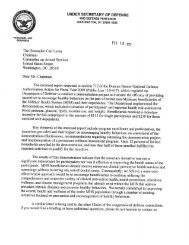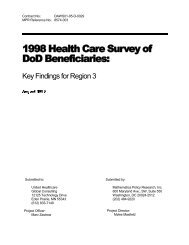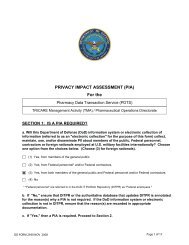Medical Management Guide, 2009, Version 3.0 - Tricare
Medical Management Guide, 2009, Version 3.0 - Tricare
Medical Management Guide, 2009, Version 3.0 - Tricare
- No tags were found...
Create successful ePaper yourself
Turn your PDF publications into a flip-book with our unique Google optimized e-Paper software.
Page 98Case <strong>Management</strong> <strong>Version</strong> <strong>3.0</strong><strong>Medical</strong> <strong>Management</strong> <strong>Guide</strong>• Valid unrestricted clinical license to practice.• Social worker case managers — current licensefrom a U.S. jurisdiction and must be LicensedMaster’s Social Worker (LMSW).• A minimum of two years of recent experience(within the last four years) in professionalnursing, social work, or CM for adults, children,families, seniors, or groups.• Employed for the past 12 months in ahealthcare-related field.• Current basic life support (BLS) certification.• Knowledge and experience, or comprehensionduring training, in the performance of core CMactivities (i.e., patient advocacy, assessment,planning, implementation, coordination,monitoring, evaluation).• Demonstrated expertise in resolving complicatedhealthcare, social, interpersonal, and financialpatient situations.• Experience in program planning and conductingindividual, family, group, and communityassessments.CertificationValid desirable qualifications are certification by aCM-specific program upon hire or within 24 monthsof employment. Refer to the following resources:• Commission for Case Manager Certification(CCMC): http://www.ccmcertification.org/.• American Nurse CredentialingCenter (ANCC): http://www.nursecredentialing.org/.• CMSA: http://www.cmsa.org.Ethical Practice StandardsEthics address the judgment of right and wrongand good or bad. Per the CMSA’s 1996 statementon ethical CM practice, case managers adhere tothe code of ethics for their profession of licensure.CM is guided by the ethical principles of autonomy,beneficence, non-maleficence (not harming others),justice, and veracity (Beauchamp and Childress,1994/2008).The patient is always the primary considerationwhen making CM decisions. This means thepatient must be involved in all aspects of decisionmaking,including being informed of options andconsequences prior to making decisions. The casemanager works closely with the patient duringthis process in order to help him/her achieve selfmanagement.The case manager is obliged to promote for thegood of the patient (beneficence) and refrainfrom doing harm to the patient (maleficence).The case manager is intimately involved with thedissemination of services and resources on anindividual basis (justice). Truth-telling (veracity) isimperative for development of trust with a patient,and must be built among patients, case managers,and healthcare providers.The case manager must follow the regulationsset forth in his/her state licensing body, as well asthose practice guidelines published by nationallyrecognized organizations in the industry of managedcare, particularly the CMSA and URAC. In 2002, theCMSA published standards of practice delineatingguidelines for the CM profession.


